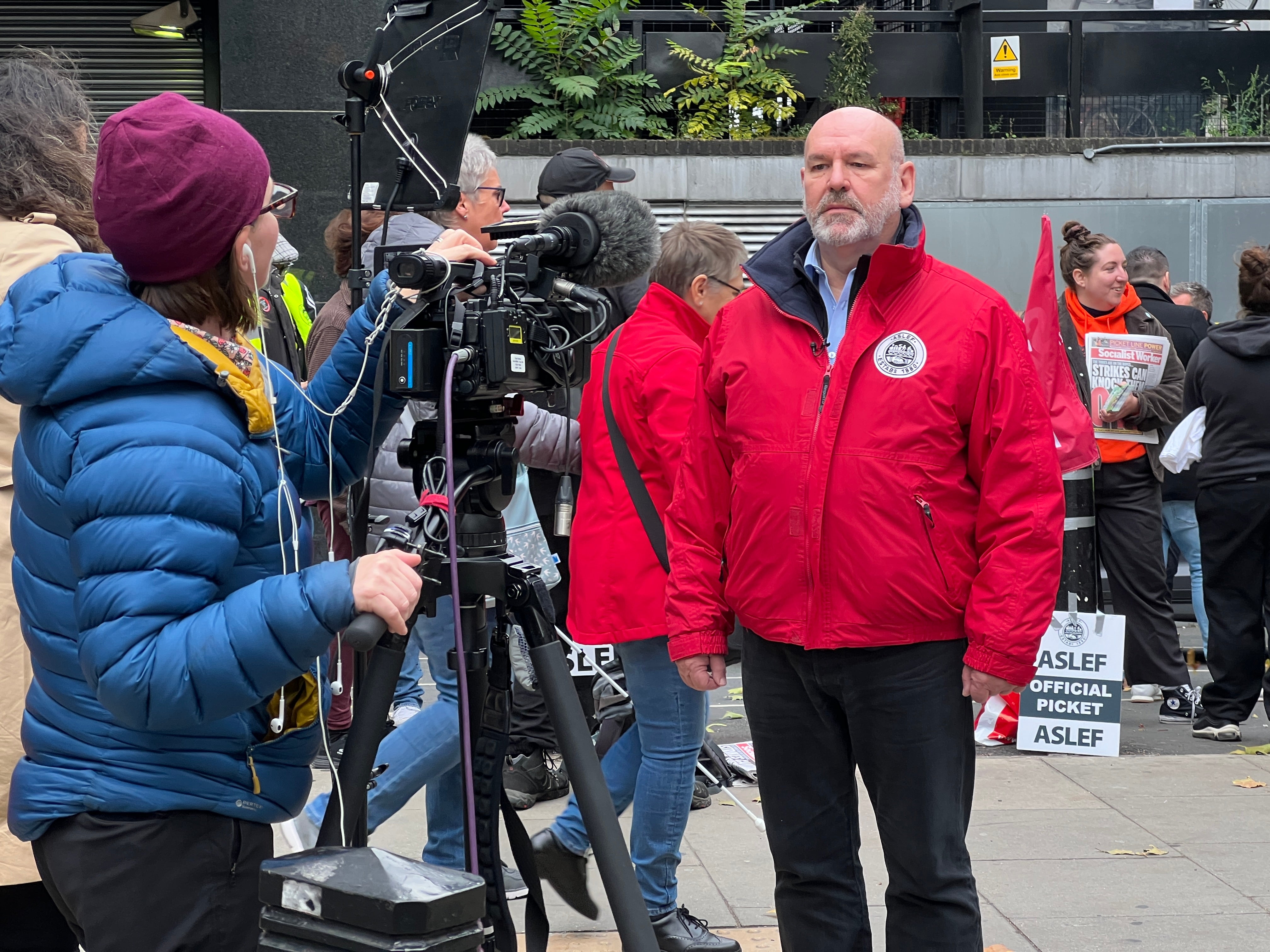Why the rail strikes could all be over by Christmas
The Man Who Pays His Way: Union bosses are longing for a deal to stop train strikes

Your support helps us to tell the story
From reproductive rights to climate change to Big Tech, The Independent is on the ground when the story is developing. Whether it's investigating the financials of Elon Musk's pro-Trump PAC or producing our latest documentary, 'The A Word', which shines a light on the American women fighting for reproductive rights, we know how important it is to parse out the facts from the messaging.
At such a critical moment in US history, we need reporters on the ground. Your donation allows us to keep sending journalists to speak to both sides of the story.
The Independent is trusted by Americans across the entire political spectrum. And unlike many other quality news outlets, we choose not to lock Americans out of our reporting and analysis with paywalls. We believe quality journalism should be available to everyone, paid for by those who can afford it.
Your support makes all the difference.Simon Calder, also known as The Man Who Pays His Way, has been writing about travel for The Independent since 1994. In his weekly opinion column, he explores a key travel issue – and what it means for you.
All over by Christmas: that is my perhaps ambitious prediction for the toxic tangle of rail disputes currently wrecking the journey plans of millions of travellers. The long and bitter conflict between unions, train operators, Network Rail and a succession of transport secretaries is approaching a terminus.
“Oh no it’s not,” you might chorus from the cheap seats of your favourite pantomime venue – especially if you have been seeking to travel on the West Coast main line this weekend from London Euston, completely closed once again due to a train drivers’ strike.
But hear me out. My conclusion is based on conversations with the two leading union bosses and statements from the Department for Transport (DfT) and transport secretary. I also have a growing sense that everyone is exhausted by the national rail strikes that have traumatised train travel since midsummer.
Let me start with Mick Whelan, general secretary of the train drivers’ union, Aslef. His members employed by 11 train operators took industrial action on Saturday. Seven of the rail firms ran no trains; the remaining four (LNER, GWR, Greater Anglia and TransPennine Express) offered skeleton services.
“It actually appals me that we’re out on strike – and nobody’s seeking to resolve it,” said Mr Whelan.
He told me on Friday afternoon he could see “no solution in sight”. Yet he will be meeting Mark Harper, the new transport secretary, on Wednesday, and told me: “I’m looking forward to the meeting. I’m going there with hope as always. You know me: I want a resolution.”
Conversely, I believe Mr Harper is a minister in search of an off-ramp, or whatever is the rail equivalent. His two predecessors, Grant Shapps and Anne-Marie Trevelyan, could do little more than berate the workers (and, in the case of Mr Shapps, attempt to blame the Labour Party for the strikes).
The Department for Transport (DfT) studiously sought to distance itself from the fierce negotiations between Network Rail, the train operators and the unions. Yet everyone knows the government is deeply involved. With the vast majority of trains specified by ministers and underwritten with billions of pounds of taxpayers’ cash, the eventual settlement must be signed off by the Treasury.
The RMT’s December and January strikes (plus the inability of travellers rationally to plan UK rail trips more than two weeks ahead) are already damaging hospitality and retail businesses, and consequently eroding VAT receipts. The chancellor will be painfully aware that this is the last thing a nation already sliding into recession needs.
Politically, with a growing sense that the UK is unravelling into a winter of discontent, the rail disputes are among the easier to tackle.
Mick Lynch, general secretary of the RMT union, was expecting to sign a deal last Monday – but says the crucial meeting was called off at less than an hour’s notice.
In response, he conducted an impromptu “pavement press conference” outside the rail union HQ near Euston Station, London. Mr Lynch was furious about what he said was government interference, and announced eight days of strikes plus an overtime ban in December and January.
But he knows more industrial action will hit members’ earnings hard over Christmas.
Three days later, we reporters formed a loose scrum outside the DfT to await the RMT boss after his first meeting with the transport secretary.
Mr Lynch is contractually obliged to criticise what he (and Mr Whelan) describe as “profiteering” by train operators. But he also told me his hope is to “get the railway back to normal and we can have the services running freely, properly over the Christmas period”.
Late on Friday, a spokesman at the DfT told me: “With our railways remaining in desperate need of reform, we once again urge unions to call off damaging strike action and work with employers to agree a way forward that is fair for taxpayers, passengers and workers alike.”
The next four weeks will show if my optimism is, not for the first time, misplaced.
Join our commenting forum
Join thought-provoking conversations, follow other Independent readers and see their replies
Comments